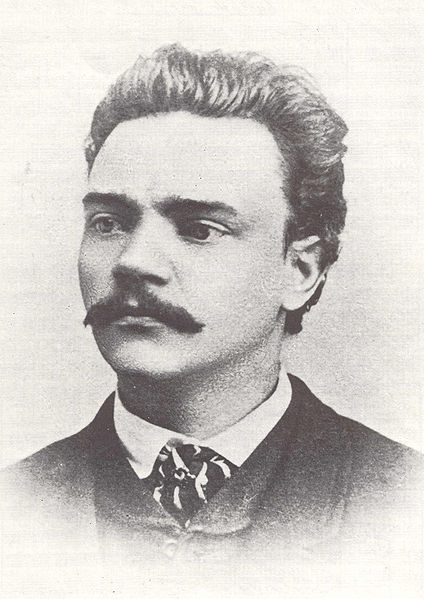Facts for Kids
Antonín Dvořák was a Czech composer known for his beautiful music blending folk and classical styles, influencing generations of musicians.
Overview
Major Works
Cultural Impact
Musical Influences
Final Years And Death
Recognition And Awards
Early Life And Education
Legacy In Classical Music
Collaborations And Friends
Innovations In Composition
Dvořák's Connection To American Music

Inside this Article
Johannes Brahms
Czech Republic
United States
New York City
Becoming
Interest
Concert
Musical
Culture
People
Future
Did you know?
🇨🇿 Antonín Dvořák was born in the Czech Republic on September 8, 1841.
🎶 He created many beautiful pieces of music that are still enjoyed today.
🏡 Dvořák grew up in a small village called Nelahozeves, near Prague.
🎻 He started studying music and playing the violin at the age of 6!
🌟 Dvořák became one of the most important composers of the 19th century.
🎼 He was inspired by Czech folk music and other famous composers.
🌎 Some of his best-known works include the 'New World Symphony.'
🪕 Dvořák blended traditional folk music with classical styles in unique ways.
🎖️ He received many honors and became famous in Europe and America.
🌏 Today, Dvořák's music continues to influence musicians worldwide.
Introduction
His works, like symphonies and string quartets, mixed folk music and classical styles. Many people enjoy his music, and he even became one of the most important composers of the 19th century! Are you ready to learn more about his life and contributions to music? Let’s go!
Major Works
Some of his best-known works include the "New World Symphony," which was inspired by his time in the United States! 🌎
He also wrote a popular piece called "Slavonic Dances," which celebrates his Czech heritage. Other important works include "Cello Concerto" and operas like "Rusalka." Each piece tells a story and makes people feel different emotions. Dvořák's music continues to be performed in concerts worldwide, bringing joy to listeners everywhere! 🎉
Cultural Impact
He showed that classical music could include folk traditions, helping people appreciate their cultural heritage. His time in America also led him to introduce new sounds and ideas, influencing many musicians and composers. 🎹
Dvořák's works helped bridge the gap between different music styles, making classical music more accessible and relatable. Today, his music is celebrated worldwide, influencing generations of musicians and shaping the way we listen to and understand music! 🌏
Musical Influences
He loved Czech folk music, which includes songs and dances from his home country. Dvořák would listen to village musicians and even traveled around to learn more about these sounds. He was also influenced by other great composers like Johannes Brahms and Richard Wagner. 🎼
This combination of influences helped Dvořák create music that mixed traditional folk tunes with classical styles. He wanted to show the beauty of his culture to the world!
Final Years And Death
He returned to his home in the Czech Republic, where he wrote some of his last works. His health worsened, and sadly, he passed away on May 1, 1904, at the age of 62. Dvořák was honored with many tributes after his death. People remember him for his beautiful melodies and the way he blended different musical styles. 🎼
To this day, Dvořák is celebrated as one of the greatest composers of all time, leaving a lasting mark on classical music history! 🌟
Recognition And Awards
He became famous in Europe and America for his incredible talent. In 1892, he was appointed to a prestigious position as the director of the National Conservatory of Music in New York City. 🗽
This is a big deal! Dvořák also won various awards and was recognized by music societies across the world. Even after his death, people remembered him for his contributions to music, receiving honors like having streets, parks, and concert halls named after him! 🎖
️
Early Life And Education
His parents owned a pub, and his dad played music too! At age 6, Dvořák began studying music and learned to play the violin. 🎻
Later, he attended the Prague Conservatory, where he learned a lot about composing and music theory. His teachers saw his talent, and that inspired him to create amazing music! Just imagine a kid like you becoming a music star! 🌟
That’s exactly what happened to Dvořák!
Legacy In Classical Music
His innovative approach continues to influence composers today. Many modern musicians draw inspiration from his use of folk melodies, rhythms, and unique orchestration. 🎻
His music is performed in concert halls and by orchestras all over the world. Dvořák's storytelling through music creates beautiful experiences for listeners, making his pieces timeless. Whether it's children learning to play his melodies or adults enjoying a symphony, Dvořák's spirit lives on in the hearts of music lovers everywhere! 🌏
Collaborations And Friends
One of his closest friends was Johannes Brahms, who supported Dvořák’s music career. Brahms even helped him get his first music published! 🖊
️ Dvořák also worked with various musicians and conductors. He was known for being friendly and encouraging towards other composers, often sharing ideas and insights. Together, they created wonderful music that continues to inspire people. Dvořák believed that music was better when people worked together, leading to beautiful melodies and new friendships! 🤝
Innovations In Composition
He combined classical and folk music in new ways. For example, in his "New World Symphony," he used rhythms and melodies that were inspired by African American spirituals and Native American songs. 🪕
This blend made his music unique and exciting! Dvořák also experimented with musical forms, like using different structures for his symphonies. His fresh ideas sparked interest in national styles, encouraging other composers to explore their cultural roots!

